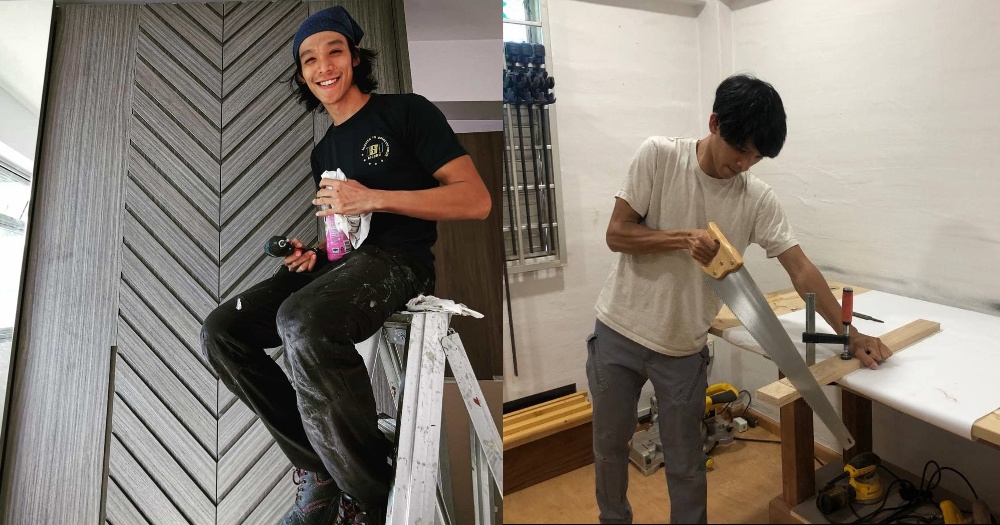Follow us on Telegram for the latest updates: https://t.me/mothershipsg
In 2018, Ziyad Ahmad Bagharib went on a trekking trip in Sumatra, Indonesia after he graduated from Yale-NUS.
There, he saw the locals building homesteads using natural resources from the surrounding forests, demonstrating a keen knowledge that amazed him.
"I'll be walking through the forest, and all I know is like, oh trees! But every minute they're telling me something like, oh, this plant can be used for that, and oh if you eat this, it's good for that. They just know this landscape in a way that is so opaque to me."
This reminded him of a childhood dream he had, which was to some day build his own house in the forest.
He recalled a conversation with his then-girlfriend when he was 17-years-old, where she asked him what his ideal home was.
"I answered her, I wanted to have a wooden house somewhere in the middle of the forest, and she got pretty upset because she doesn't like the wilderness," he laughed.
Ziyad's ideal house would be an off-the-grid wooden cabin surrounded by nature.
 One of the many homesteads Ziyad saw in Sumatra. Image via Ziyad Ahmad Bagharib.
One of the many homesteads Ziyad saw in Sumatra. Image via Ziyad Ahmad Bagharib.
While building his own home might not be possible in the short run, he decided that he would try and start working towards it in a tangible way, by first learning to become a carpenter.
Interviewing in a storeroom
Entering the carpentry industry wasn't easy. After all, it wasn't as simple as finding one's preferred company on LinkedIn, and sending them a resume.
Ziyad spent a lot of time searching for carpenter apprenticeships online, but found that not many companies wanted to recruit apprentices in the first place, for a very practical reason:
"You have to spend so much time on this person, and you have to trust that they will be interested enough to actually be helpful to you in the long run."
After facing multiple rejections from companies that were actually looking for apprentices, Ziyad eventually stumbled upon a firm called Reno Scout.
The company appeared "quite dodgy" at first, admitted Ziyad, as it had a Facebook page with only 200 likes, and interested applicants were supposed to message the company via WhatsApp.
However, he went ahead and contacted the company, and soon found himself in an interview, face-to-face with the company's boss in a storeroom within an industrial unit.
It turns out that the company itself was a start-up, and if Ziyad nailed his interview, he would technically be the company's first staff.
Although the boss tried to warn Ziyad about the working conditions, explaining to him that it will likely be quite uncomfortable and tiring, Ziyad assured him that he was up for the challenge.
"I see my friends working in consultancies or finance, they're wearing long-sleeved shirts and going to the office and all that. I'm like, I can't do that, and I can't see myself doing that. I said that to him. And he looked at me like I just said the right thing."
Naturally, Ziyad got the job after this, securing a two-year contract to work with Reno Scout.
Dad thought carpentry work was too dangerous
Ziyad's enthusiasm for carpentry was, unfortunately, unmatched by that of his parents. His mother was "pretty cool" with his decision but his father was less pleased because he felt the industry was a dangerous and unhealthy one.
His dad's concerns were not unfounded, said Ziyad, adding that many people in the industry have lost a finger or two during the course of their work, largely due to the table saw, which is used to cut large blocks of wood.
In particular, the older folks tend to have faced more major accidents, given that safety procedures weren't as frequently adhered to in the past.
Thankfully, safety has risen on the list of priorities over the years, and apart from accidentally drilling into the side of his index finger on one occasion, Ziyad is mostly fine.
"At least I still have all my fingers," said Ziyad as he waved his hands in front of me.
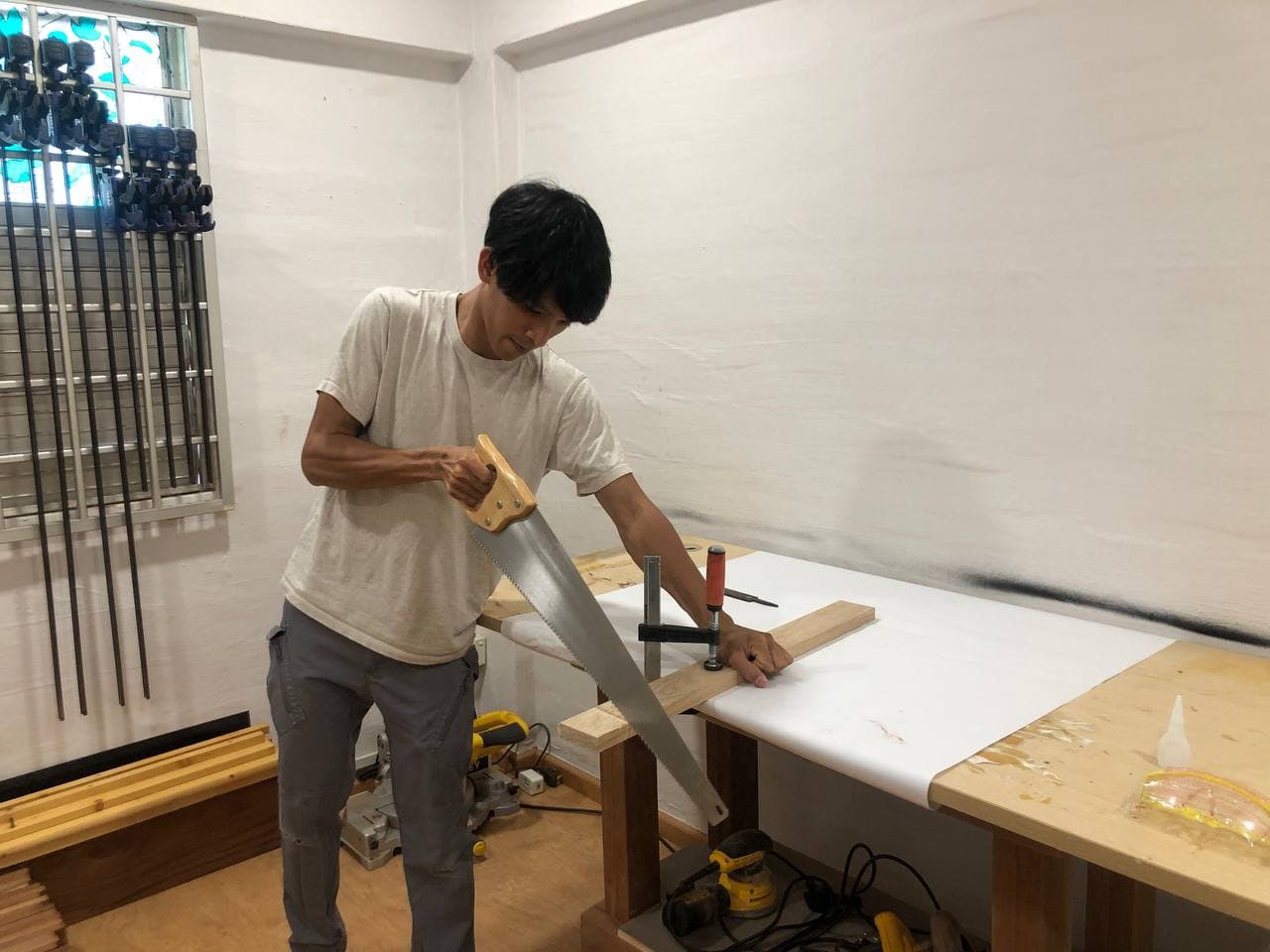 Ziyad demonstrating how to cut a piece of wood without slicing off your fingers. Image via Jason Fan.
Ziyad demonstrating how to cut a piece of wood without slicing off your fingers. Image via Jason Fan.
He had to put on many hats for his job
When asked what a typical day in his job was like, Ziyad had a simple answer: There isn't a typical day in the life of a carpenter.
While he was officially a carpenter apprentice, he was also a member of a renovation company, so his daily tasks were extremely varied.
He would bounce between cutting down wood pieces to size and spending hours doing miscellaneous tasks like cleaning a newly renovated house.
"If we are at the tail end of a renovation, and the house is pretty much done, but needs to be cleaned thoroughly, I will literally spend the whole day cleaning the cabinets, washing the toilets, mopping the floor, all that kind of stuff."
Working in a start-up, he was also assigned the role of handling its social media platforms. When his company decided to start a YouTube channel, Ziyad, being the youngest, was also the man in charge of helping it grow.
In fact, he had to master Adobe Premiere Pro from scratch in order to put together many of Reno Scout's videos, like this one here:
&feature=youtu.be&ab_channel=RenoScout
But this is not to say that he did not do his fair share of carpentry work, much of which was learned on the job.
He was often assigned many difficult tasks, which he had to learn quickly in order to keep up with the fast-paced nature of the job.
A particularly fond memory that Ziyad shared was the time he had to install locks on six drawers before the end of the day for a client — not a difficult feat for a carpenter, except for the fact that Ziyad had never installed locks on drawers prior.
And so when his colleague left (Ah Huat always left at 5.30pm on the dot, Ziyad laughed), he was left to his own devices.
Armed with basic instructions from Ah Huat, along with the very helpful tip to "use masking tap and draw pencil lines" to make the job easier, Ziyad managed to accomplish his task at last at 9pm.
He said that when he returned to the office, he received a "hero's welcome"; both his boss and Ah Huat immediately praised him for his efforts.
"Before that point, I feel like everyone saw me as the kid. You know, like the apprentice. The one who doesn't know what he's doing. But after that point, everyone started to treat me with a little more respect."
And in case you're wondering, Ziyad was promoted to a full-time staff shortly after this "test" of sorts, one that he passed with flying colours.
 Ziyad soon left his apprentice days behind him, as he was promoted to a full-time staff around six months into the job. Image via Reno Scout/IG.
Ziyad soon left his apprentice days behind him, as he was promoted to a full-time staff around six months into the job. Image via Reno Scout/IG.
Camaraderie was highlight of his job
As Ziyad described his day-to-day experiences at Reno Scout, one thing stood out to me: his enthusiasm when speaking about his colleagues.
Apart from his boss, Ah Huat, and a fellow apprentice David, who mainly does designs, the company also employed a few carpenters from China: Ah Chen, Xiao Chun and Ah Kuan.
It was a rough start, as one may expect, given the language barrier, leading to many hilarious encounters.
He described his first interaction with Ah Chen, the company's first employee from China:
"I tried to say something like, everything okay? And he just looked like at me, there were no words, no attempt to engage at all," he laughed.
Eventually, however, the two would become buddies, as they began to learn a little of each other's language, using the Google Translate app.
"I remember Xiao Chun's first words in English were 'very much'. He's a funny guy, he would be working at a table saw doing his own thing, and then out of nowhere, he will go 'very much!' I found that really funny."
Ziyad would go on to learn basic phrases in Mandarin as well.
However, it turns out that a common language wasn't even necessary for carpentry work, as it actually took "very few words" for them to work together.
"Let's say Xiao Chun is building a kitchen. I can see what he's doing, I know what he's trying to do. And by virtue of us having that common vocabulary of how the wood is supposed to go together, we can work together."
In a way, the wood that they were working together became the medium through which they communicated.
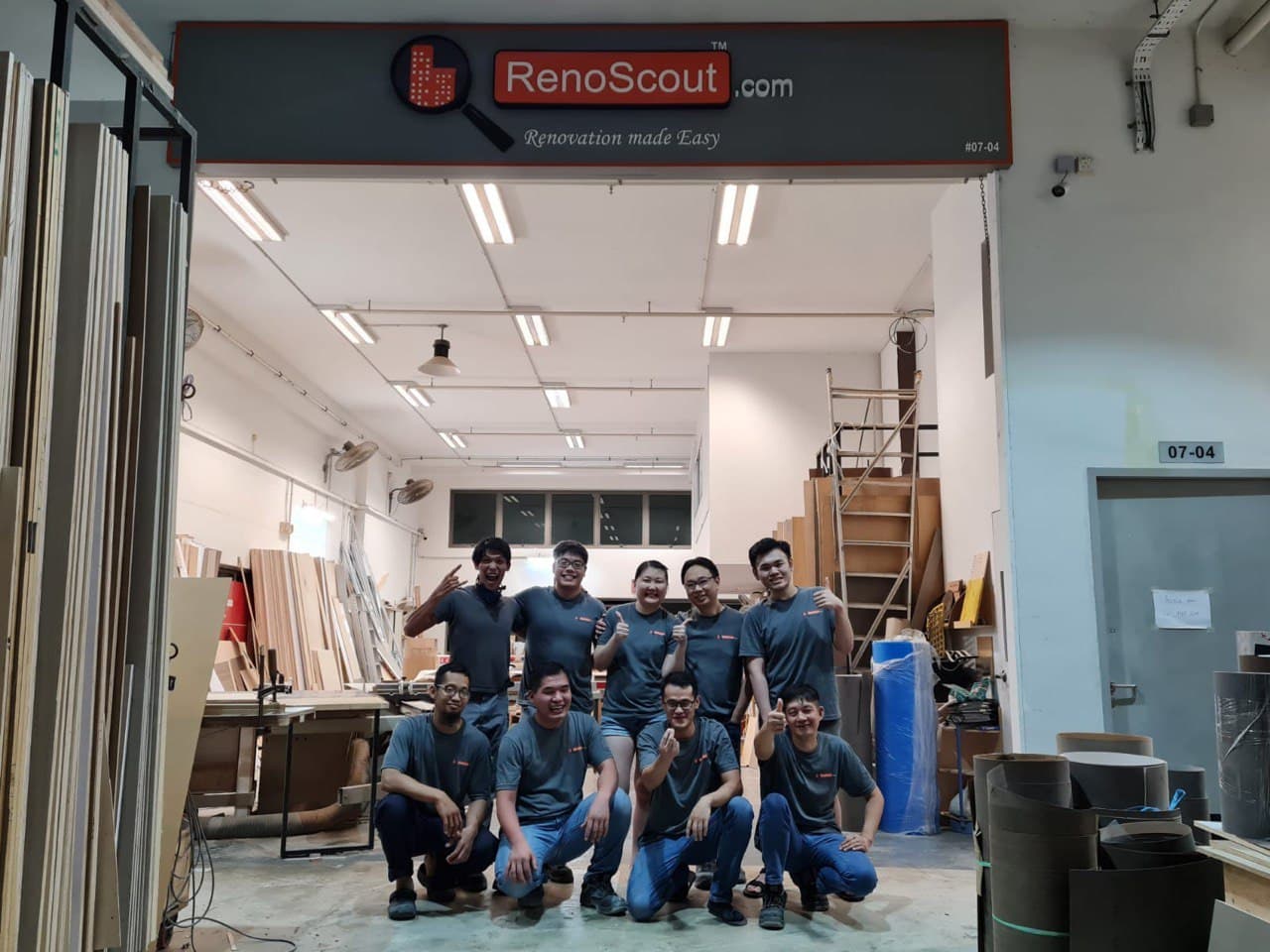 Ziyad's last day of work with the team. Image via Ziyad Ahmad Bagharib.
Ziyad's last day of work with the team. Image via Ziyad Ahmad Bagharib.
Appreciation for skilled blue collar jobs in Singapore is lacking
As we were deep into the interview, I finally took the chance to ask Ziyad the golden question: how much was he paid during his job?
Ziyad was quite up-front with this: He earned S$1,500 a month, before CPF deductions, for his first six months as an apprentice.
After the six-month mark, when his boss assessed that he was good enough to become a full-time employee, Ziyad's pay went up to around S$2,000 a month, plus commission for each piece of work he did, a salary that was, in his words, "more comfortable".
This quantum is typical for the industry, he added.
Another thing that Ziyad shared, on a more sombre note, is how carpentry is not typically valued in Singapore.
Ziyad follows a carpenter in New Zealand on YouTube, and realised that the customers in New Zealand treat their carpenters with a degree of respect, as they see the profession as a valuable and skillful profession that is necessary in society.
This, however, isn't really the case in Singapore, he said. Appreciation "just doesn't exist" for manual blue collar jobs.
Even though qualifications do not really exist for the carpentry industry, he said that many local carpenters are highly skilled individuals, with expertise that can only be honed through years or even decades of training and practice.
And when asked whether he has met a graduate carpenter, such as himself, he replied that he hasn't met one, but it was also because he never asks anyone for their education background.
"Yeah, like who cares, man? It's like, if you can make the object, you're a carpenter."
Not necessary for your job to be the dominant thing in your life
Ziyad recently ended his two-year contract with Reno Scout, citing other work commitments.
However, this does not mean that he is done with carpentry or creating his own furniture, which he documents on his own woodworking Instagram page.
https://www.instagram.com/p/CAaCj7yH5Bg/
In fact, on the day that we met, Ziyad was busy designing and building a custom table for his friend, who works in the music industry.
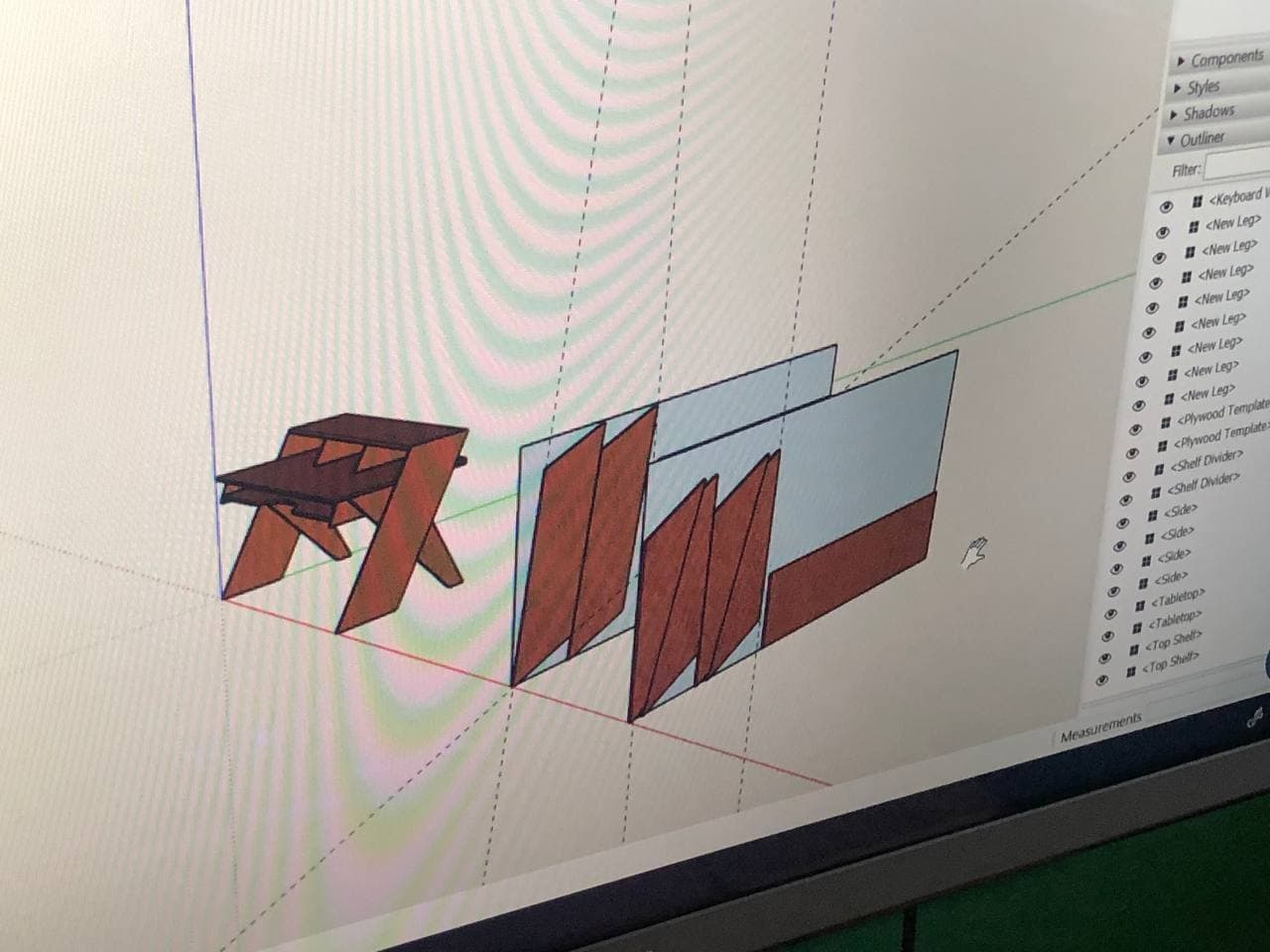 A 3D model of the table that Ziyad is currently working on. Image via Jason Fan.
A 3D model of the table that Ziyad is currently working on. Image via Jason Fan.
Ziyad regularly receives such requests for custom furniture from his peers, so much so that he has had to turn down many of them down, due to time constraints.
Why not do continue doing carpentry full-time, given that his passion for it is still going strong?
His answer was simple: It just isn't necessary to do so:
"You don't always have to do something as a job for it to become the dominant thing in your life."
He went on to explain that while it was important for him to embark on a two-year stint in carpentry full-time, in order to learn the necessary skills, he feels he can spend the rest of his life building upon this foundation, upgrading his skills in the process, even if he has to make mistakes along the way.
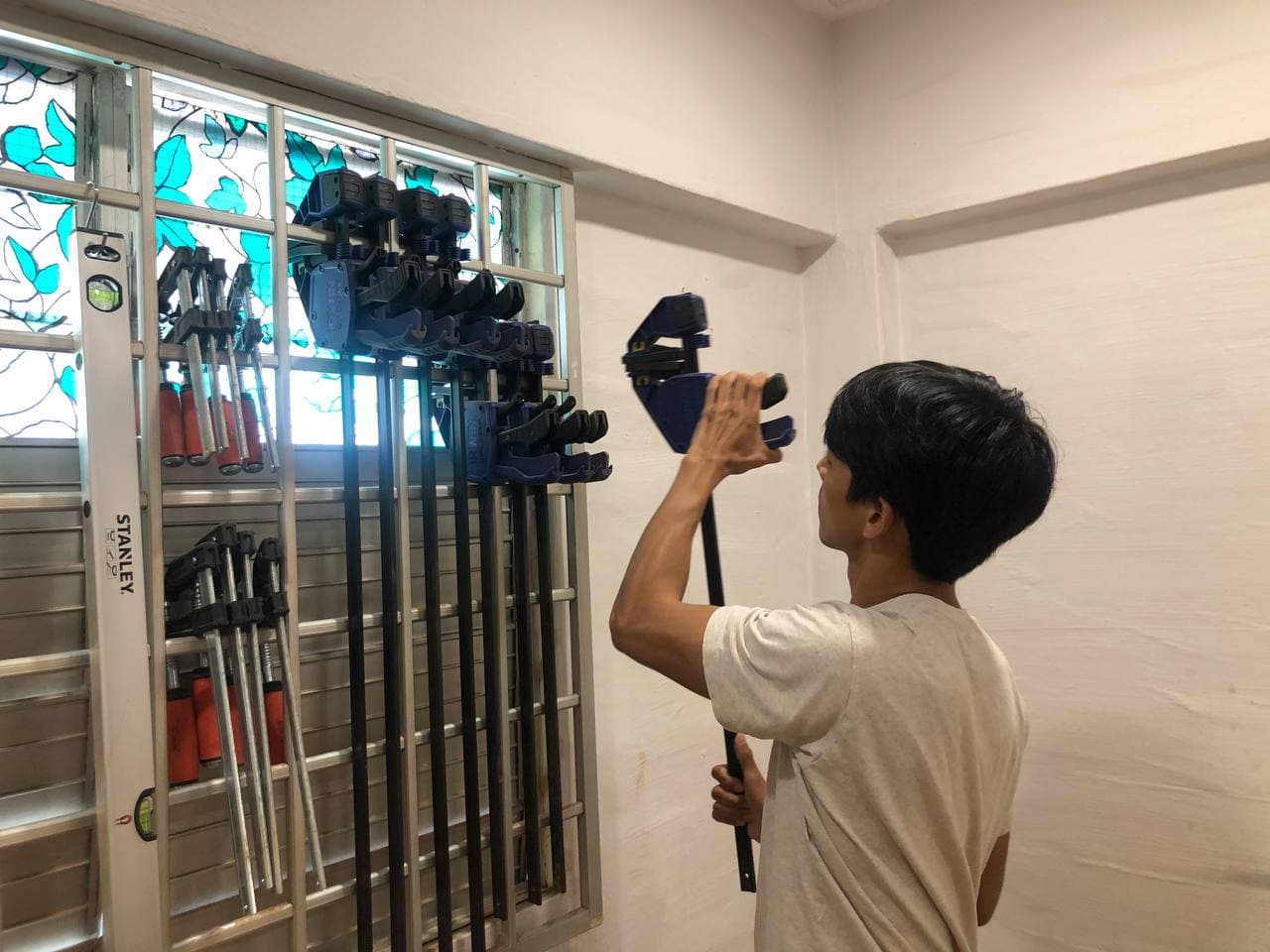 Ziyad continues to be involved in carpentry, even after his two-year stint is over. Image via Jason Fan.
Ziyad continues to be involved in carpentry, even after his two-year stint is over. Image via Jason Fan.
And Ziyad isn't one to shy away from potential mistakes, given what he's learnt from his stint in carpentry.
"The thing about making mistakes in carpentry is that it's always fixable, it's just the extent of what you have to do in order to fix it. It's always fixable, there's nothing that's ever irreparable. There's no such thing as an irreparable cupboard."
Totally unrelated but follow and listen to our podcast here
Top image via Ziyad Ahmad Bagharib.
If you like what you read, follow us on Facebook, Instagram, Twitter and Telegram to get the latest updates.
